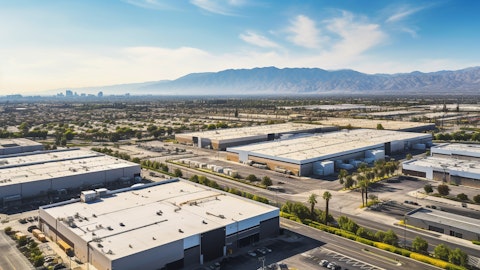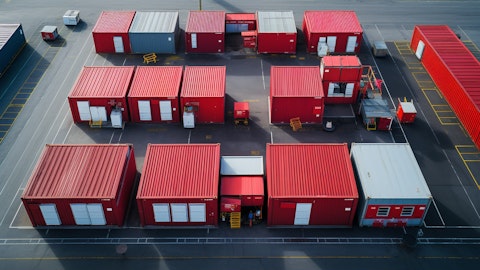Joe Margolis: Yes. I’m not sure I agree with your thesis, right? It may be $200 for that unit, but what is your alternative? If it’s move from a two-bedroom to a three-bedroom apartment, that delta is probably greater than what you’re paying for the unit. I also think it’s important to realize that our tenants consistently underestimate how long they’re going to stay for. So, maybe $200 a month but normally stay in six or seven months. It’s not a permanent drag on your monthly budget. And then they end up staying much longer, but that’s a different thing. So, I don’t think we’re — this is a flexible convenient important and relatively affordable option for people. And I don’t think we’re at that point yet where we’re capped out on rate.
Omotayo Okusanya: Fair enough. That’s helpful. And then my second question if you would allow me. Again the past 10 years, technology has been such a big game-changer in the industry. Could you help us think about the next 10 years whether it’s AI or kind of what are you seeing [indiscernible] that helps lower customer acquisition costs, that helps lower cost of operation? And how quickly can we kind of see some of that stuff get implemented and kind of hit your overall numbers?
Joe Margolis: Yes. So I mean I think we’re seeing it now and we’ll continue to see it because your thesis is right, like technology and AI are going to change things drastically. We used and tested AI in several parts of our business. Sometimes it worked well, sometimes it didn’t. We’ll continue to help us at the call center, on the web, in all sorts of data analytics. And we are striving to find the right combination of people and technology to run our stores. And we think over time that will help us optimize that expense. So you’re right, the last 10 years have shown a lot of change and a lot of efficiencies through technology and I expect the next 10 years to be the same.
Omotayo Okusanya: Thank you.
Joe Margolis: Thank you.
Operator: Thank you. Our next question comes from Ki Bin Kim with Truist. Your line is open.
Ki Bin Kim: Thank you. Good morning. Just want to go back to your bridge loan program. You obviously announced a pretty major increase in the pipeline. Just curious if you can provide more color on where this demand is coming from? And just high level I mean the rates are a bit higher 9%. So what is the kind of profile of the customer that would come to you guys for this type of loans?
Joe Margolis: So I think it’s customers that have expensive equity partners that want to get cashed out folks that don’t think this is the greatest sales market where there’s been – where there’s been value created. One, we talk about the benefits of the Life Storage transaction. One benefit we don’t really talk about is we were introduced to a whole new group of partners we didn’t have relationships with. So we’ve closed or have under termed sheet $239 million worth of bridge loans with LSI Partners, we had no relationship with before closing. And we’ve got – I’m off topic now but we have signed 30 management contracts, new management contracts with LSI partners, we have relationships with. So part of the increase in our bridge loan volume is we have all these new relationships now we got through the merger and we’re doing a lot of business with them.
Ki Bin Kim: And that was actually part of my second question. Do the vast majority of these come with management contracts and – management contracts can obviously be terminated but is there a sense that the management contracts lifetime can exceed the bridge loan maturities?
Joe Margolis: So 100% of our bridge loans we managed the property. We will not make a loan on a property we don’t manage for – for risk control and economic reasons. So yes, they all come with management contracts. And the management contracts can be canceled. That hardly ever happens. It hardly ever happens if someone cancels a public or a cube contract that comes to us. People don’t move like that. We expect, if we’re a good manager and we produce good results that we’re going to have these relationships and manage these properties after the bridge loan is gone, unless we end up buying the property which is also an opt.
Ki Bin Kim: And second question on CapEx. Can you just provide some color? I know you don’t really disclose it on the maintenance CapEx, you spend in 2023 and what we should expect in 2024, obviously excluding development or whatever solar projects you might have?
Scott Stubbs : Ki Bin, our maintenance CapEx has typically been about $0.65 a square foot, and we would expect it to be pretty similar in 2024.
Ki Bin Kim: Okay. Thank you guys.
Scott Stubbs : Thank you, Ki Bin.
Operator: Thank you. There are no further questions. I’d like to turn the call back over to Joe Margolis for closing remarks.
Joe Margolis: Great. Thank you. Thanks, everyone, for your time and your interest in Extra Space. I hope you could tell we are — we’re off to a good start. We’re really excited about the rest of the year. We can’t control all the variables. We don’t know — we can’t control the housing market and the customer. But what we can control, we do very well. We have the platform and the people to take advantage and optimize whatever the external situation is. So I hope everyone has a great day, and thank you for your time.
Operator: Thank you for your participation. This does conclude the program. You may now disconnect. Have a great day.
Follow Extra Space Storage Inc. (NYSE:EXR)
Follow Extra Space Storage Inc. (NYSE:EXR)
Receive real-time insider trading and news alerts




